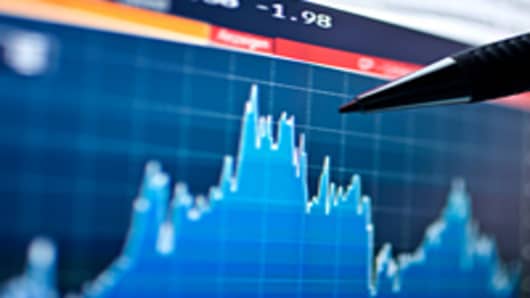Soured by last week's U.S. employment report, investors are heading to the high ground in an effort to avoid fall out from Europe.
As a result, the best performers Monday were safe-haven utilities and telecom, and the worst were industrials, financials and tech. Jittery investors even took a bite out of tech darling Apple's stock on the day it unveiled a new iPhone.
Tuesday's markets face more head line risk from Europe, as EU finance ministers meet in Luxembourg, and Spanish public sector workers strike over austerity measures. Hungary stayed in the spotlight even as European and IMF officials attempted to assure markets. Spreads on European debt remained under pressure Monday, with even French bonds seeing spreads widen and credit default swaps rise.
The Dow Monday lost 115 points, or 1.2 percent to 9816. The S&P 500 fell 13, or 1.4 percent to 1050, now down 4.75 percent since Friday, its biggest two-day decline since March, 2009. The selling hit Nasdaq harder, taking it down 2 percent to 2173. The biggest losses for stocks came in a volatile final hour.
"The last hour sell off correlated pretty tightly with a further leg down in the value of the euro," said Art Hogan, managing director at Jefferies. "There's a real lack of conviction. People will point to a lot of things. You had energy down, dollar up. There was some mild positioning with what's going on with Goldman Sachs, so financials took a hit." Goldman Sachs was subpoenaed by the Financial Crisis Inquiry Commission, which said the firm failed to comply with its request for documents.
"We were going through a period of time where we knew things were being affected by the euro and Europe's issues and we could step back and say at least things were improving in the U.S. economy. Now the economy has been called into play when you have that one bad piece of data," Hogan said. The May employment report Friday was well below economists's forecasts. It showed the creation of 431,000 non farm payrolls in May, but most of the jobs were temporary government census workers.
Patrick Kernen, who trades options on the S&P 500, said investors, in some ways, appear less anxious but are still very cautious. He said investors are not paying the high premium for downside protection that they were paying several weeks ago.
"There really hasn't been a panic of people to rush in and buy puts, which to some degree is encouraging," he said. "I haven't seen much panic, not to imply it doesn't mean we're not going to have volatile markets. People aren't preparing for a 10 percent down day, at least."
The S&P closed on the important 1050 level, and traders see the next important zone 10 points lower. "Everybody is talking about the 1040 level in the S and Ps. Maybe it will get there because everybody is talking about it. ..Is the horse leading the cart or the cart leading the horse?" Kernen said. He said he expects to see the S&P at 1000 before the end of the summer, but it would probably reverse right back up to 1100 after that.
"Is the volatility high because we've been having these big intraday movers or because there's a bigger event on the horizon. I think everybody's afraid of a bigger event on the horizon, but they're not petrified of it," he said.
Traders, for the past several days, have talked about the unwillingness of investors to step in and buy the dips, as they had previously. "There's not anybody in the market doing anything to draw a line in the sand," said one trader.
Hogan said the negative sentiment surrounding British Petroleum's leaking oil pipe in the Gulf of Mexico is also taking a toll on stocks. The economic impact is unclear, apart from the immediate costs shouldered by BP. "It does cast a pall over the market that's hard to shake," he said.
BP stock was lower Monday, even as it made some progress in its latest attempt to cap the flow of oil.
Euro Drama
The euro fell to $1.917 per dollar, losing another 0.4 percent Monday and setting a fresh four-year low.
GFT Forex's Boris Schlossberg said the euro will probably continue its trek lower. "I think we run the risk of seeing 1.16/1.17 before the next selling phase dies down. The euro is just absolutely hated here. The European rescue package still faces some regional opposition. There were rumors the German high court could rule it was unconstitutional. They don't have a federal mechanism to put it in place, and there's worries that at any point in time, the rescue package could be sabotaged," said Schlossberg.
Investors continued to run to the safety of Treasurys Monday, and as a result yields fell. The 10-year was yielding 3.186 percent, its lowest level since May 25. Gold also found buyers, climbing 1.9 percent to $1239.30 per ounce, its largest one day gain since Feb. 16 and highest close since May 12.
Copper was another story. The metal hit a new 2010 low, finishing at $1.2.7590 per pound, a 1.9 percent decline on concerns about the global economy. Oil fell $0.07 to $71.44 per barrel.
What to Watch
The Treasury auctions $70 billion in notes and bonds this week, starting Tuesday with $36 billion in 3-year notes at 1 p.m.
Nomura Treasury strategist George Goncalves expects the auctions to go smoothly. "It's going to be a liquidity event. Now, given the way the markets are trading, people are going to view Treasury auctions as an opportunity to get in. The need to put money to work even at these yields. They going to find the auctions as a means to an end, not the end," he said. 10-year notes and 30-year bonds are auctioned Wednesday and Thursday.
The NFIB small business survey is released at 7:15 a.m. Tuesday, and Dollar General reports earnings before the bell.
Questions? Comments? Email us at marketinsider@cnbc.com



